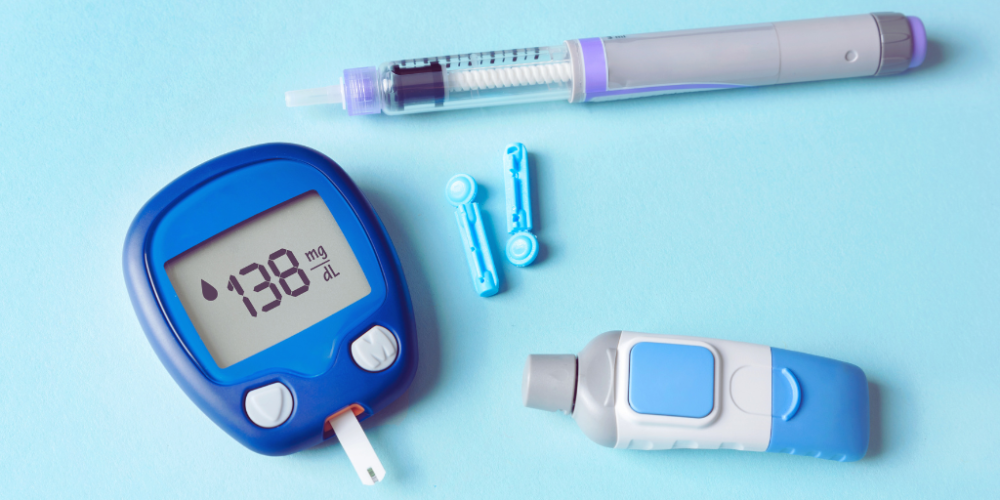 Living with diabetes can be a real challenge, especially when you start feeling those uncomfortable symptoms like burning feet, tingling hands, or muscle weakness. These can be signs of something called diabetic neuropathy, which is a common issue for many people with diabetes. It’s basically when high blood sugar damages your nerves, and it can be pretty painful and make everyday life tough. But don’t worry, there are things you can do to help manage these symptoms and improve your quality of life. This article will talk about seven important vitamins and nutrients that can be super helpful for people with diabetes and pre-diabetes.(Based on the insights from Dr. Andre Wambier, cardiologist)
Living with diabetes can be a real challenge, especially when you start feeling those uncomfortable symptoms like burning feet, tingling hands, or muscle weakness. These can be signs of something called diabetic neuropathy, which is a common issue for many people with diabetes. It’s basically when high blood sugar damages your nerves, and it can be pretty painful and make everyday life tough. But don’t worry, there are things you can do to help manage these symptoms and improve your quality of life. This article will talk about seven important vitamins and nutrients that can be super helpful for people with diabetes and pre-diabetes.(Based on the insights from Dr. Andre Wambier, cardiologist)
💡Understanding Diabetes and Its Complications

Diabetes often sneaks up on people. A lot of folks don’t even know they have it. In the United States, for example, about 1 in 4 people with diabetes — that’s roughly 25% — aren’t aware they have the condition. We’re talking about more than 38 million Americans living with diabetes, with the vast majority having Type 2. Plus, over 98 million American adults are considered prediabetic, meaning their blood sugar is higher than normal, and they’re at risk of developing full-blown diabetes if they don’t make changes.
So, why is it so important to know if you have diabetes or pre-diabetes and to get it under control? Because diabetes can really mess with your body. It can lead to serious problems like:
- Increased risk of infections: Including severe ones like sepsis.
- Heart problems: A higher chance of heart attacks, strokes, and even amputations.
- Hypoglycemia: This is when your blood sugar drops too low.
- Kidney issues: Diabetes is a leading cause of kidney failure worldwide, often requiring dialysis.
- Diabetic neuropathy: This is the damage to your peripheral nerves, which can cause a lot of pain and discomfort. About half of all people with diabetes experience some form of neuropathy. That’s a huge number of people dealing with burning, numbness, and pain.
One of the best ways to prevent or slow down diabetic neuropathy is to keep your blood sugar levels in check and live a healthy lifestyle. That means getting enough sleep, exercising regularly, and eating well. But sometimes, even if you’re doing everything right, you might still experience neuropathy. Or maybe you’re struggling to control your blood sugar and want to prevent these complications. This is where certain vitamins and antioxidants can really make a difference. They can help prevent neuropathy or even reduce symptoms like pain, burning, and cramps.
✅Key Takeaways
- Diabetic neuropathy is a common and often painful complication of diabetes, affecting about 50% of people with the condition.
- Controlling blood sugar is key, but certain vitamins and antioxidants can offer extra support.
- Many people with diabetes, especially those taking metformin, may be low in Vitamin B12.
- Benfotiamine, a special form of Vitamin B1, shows promise in protecting nerves from high blood sugar damage.
- Magnesium and Alpha-Lipoic Acid are important for nerve health and can help with symptoms like burning feet.
📌7 Important Vitamins and Nutrients for Diabetics
Let’s talk about the seven vitamins, minerals, and antioxidants that can be really helpful if you have diabetes or pre-diabetes.
👉1. Vitamin B12

Recent studies have shown a worrying trend: more and more people with Type 2 diabetes are low in Vitamin B12. And guess what’s often the culprit? Metformin, a common medication for Type 2 diabetes. Anywhere from 5% to a whopping 33% of people taking metformin might be deficient. So, if you have diabetes, it’s a good idea to keep an eye on your B12 levels.
Vitamin B12 is super important for your nervous system. It helps form and maintain your nerves. It’s also needed for making red blood cells (which prevents anemia) and for DNA synthesis. Plus, it helps turn food into energy and can lower homocysteine, a marker linked to heart disease.
Besides metformin, other things can cause low B12, like age, certain stomach issues, weight loss surgery, or being vegetarian or vegan for a long time. That’s because B12 is mostly found in animal products like meat, dairy, and eggs.
Symptoms of low B12 can include:
- Fatigue, weakness, and low energy (signs of anemia).
- Burning and numbness in hands and feet.
- Muscle weakness.
- Balance problems and poor coordination.
- Confusion, irritability, depression, anxiety, and even dementia.
If you have diabetes, it’s really important to know your B12 levels. If they’re low, your doctor might suggest supplements, either by mouth or injections if you have trouble absorbing it.
👉2. Vitamin B1 (Thiamine) and Benfotiamine

Vitamin B1, also known as thiamine, is another important one. While it was first linked to alcoholism, it’s actually more common for people with diabetes to be low in thiamine than the general population. This can happen because of eating too many refined foods (like white bread and rice) that are low in thiamine, or due to absorption problems, especially if you’re taking diuretics for high blood pressure.
Very low thiamine can lead to a condition called beriberi, causing loss of appetite, muscle weakness, and burning feet. Thiamine is also key for how your body uses glucose and makes energy, and it helps with nerve impulses.
Natural sources of Vitamin B1 include:
- Beans, lentils, peas
- Sunflower seeds
- Pork, fish
- Yogurt
Now, here’s something interesting: there’s a synthetic form of thiamine called benfotiamine. It’s absorbed much more easily by your body because it’s fat-soluble (most B vitamins are water-soluble). This means it can reach higher levels in places like your nerves, muscles, and brain, where it’s really needed. Some studies, especially in Europe, have shown good things about benfotiamine for people with diabetes.
Benefits of benfotiamine:
- Nerve protection: If your blood sugar isn’t perfectly controlled, benfotiamine might help protect your nerves from damage caused by high sugar, reducing your risk of diabetic neuropathy. Of course, getting your blood sugar into a healthy range is still the main goal.
- Reduced inflammation: It can help lower inflammation, which is often linked to obesity and diabetes.
- Kidney health: Some studies suggest it might help reduce kidney problems.
- Heart health: It could help prevent heart disease in people with diabetes by reducing the formation of AGEs (Advanced Glycation End products), which are harmful compounds formed when sugars react with proteins or fats.
So, Vitamin B1, especially in the form of benfotiamine, can be very helpful for people with diabetes. In the US, you can find benfotiamine as a dietary supplement.
👉3. Vitamin B6 (Pyridoxine)

Vitamin B6, or pyridoxine, is important for several reasons if you have diabetes:
- Immune function: It can help boost your immune system, which is good because people with diabetes are more prone to infections.
- Brain and nerve health: It plays a role in keeping your brain and nerves healthy, potentially helping to prevent or treat diabetic neuropathy.
- Insulin sensitivity: It’s involved in how your body uses carbohydrates and might help improve how sensitive your body is to insulin.
You can find Vitamin B6 in many foods, such as:
- Dark leafy greens
- Bananas, papayas, oranges
- Chickpeas
- Fish and poultry
- Nuts and seeds
Usually, if you eat a balanced diet, you’ll get enough Vitamin B6 and won’t need to take a supplement.
👉4. Vitamin D

Low Vitamin D is super common, not just in people with diabetes, but in the general population too. Vitamin D is like a health marker. If you’re outside a lot, walking your dog, or gardening, your Vitamin D levels are probably good because sunlight is the best source. But if you’re stuck indoors most of the time, your levels might be low. For people with diabetes, Vitamin D is extra important.
It helps with:
- Blood sugar regulation: It can improve insulin sensitivity.
- Immune system: People with diabetes often have a weaker immune system, and Vitamin D can help.
- Bone health: It’s crucial for strong bones.
- Mental health: Low Vitamin D is linked to a higher risk of depression and anxiety.
- Nerve protection: It can protect against damage from inflammation and oxidation, affect neurotransmitter production (which explains the link to mood), and help prevent diabetic neuropathy. Low Vitamin D can also impact the formation and maintenance of myelin, the protective coating around your nerves.
Besides sunlight, you can get Vitamin D from eggs, fatty fish, and fortified milk. If your levels are very low, your doctor might suggest a supplement, and definitely try to get more sun!
👉5. Vitamin C

Vitamin C is a powerful antioxidant. It fights off free radicals, which are unstable molecules that can damage your brain cells and nerves. People with diabetes often have more oxidative stress, which can harm their nerves. Vitamin C also helps with your immune system and wound healing, as it’s needed to form scar tissue. It’s good for eye health too, potentially helping to prevent or slow down diabetic retinopathy (eye damage from diabetes).
Like Vitamin B6, you usually don’t need to buy Vitamin C supplements if you eat well. Foods rich in Vitamin C include:
- Citrus fruits (oranges, lemons, tangerines)
- Strawberries, kiwi, guava, acerola cherries
- Tomatoes, red bell peppers
- Broccoli
Eating a variety of these foods should give you plenty of Vitamin C.
👉6. Magnesium

Magnesium isn’t a vitamin, but it’s a mineral that’s incredibly important for people with diabetes. It can help regulate blood sugar by improving insulin sensitivity and glucose metabolism. It’s also good for your immune system, bone health, and heart health.
Magnesium also has benefits for your brain and memory:
- It can increase the density of synapses, helping your neurons communicate better.
- It might improve short-term and long-term memory.
- It could reduce the risk of age-related memory loss, which is a concern for people with diabetes.
You can find magnesium in your diet from:
- Dark leafy greens like spinach
- Whole grains like brown rice
- Beans and lentils
- Bananas, yogurt, avocados, almonds
Researchers at MIT even found a special form called magnesium L-threonate, which seems to get into the brain more easily and might help with memory and even reverse some brain aging.
👉7. Alpha-Lipoic Acid

My number one pick, which is also an antioxidant, is Alpha-Lipoic Acid. It’s also known as thioctic acid. This antioxidant offers several benefits for people with diabetes.
It helps with glucose metabolism and reduces oxidative stress by neutralizing those harmful free radicals that can damage cells and tissues. Alpha-Lipoic Acid can also help regulate blood sugar by improving insulin sensitivity and might even help control glucose levels. It can improve blood vessel function and, most importantly, protect your nerves.
Alpha-Lipoic Acid can help prevent or slow down the progression of diabetic neuropathy. I often recommend it, especially for people who describe a burning sensation in their feet, like they’re walking on hot coals. Alpha-Lipoic Acid can really help with that. A common dose is 600mg in the morning. Just a heads-up, it can make your urine smell a bit funny at first, but that usually gets better during the day.
🌱What About Bitter Melon?

You might have heard about bitter melon, also known as bitter gourd or melão de São Caetano. It’s a fruit eaten in places like Japan, India, and China. If you’ve read books about centenarians (people who live to be 100 or more), you might remember that people in Okinawa often had bitter melon plants in their gardens and would offer it to visitors. It makes you wonder if eating this fruit contributes to their long lives!
For diabetes, some small studies (around 70-100 patients) have suggested that bitter melon might help improve blood sugar and A1C levels, and even reduce fat in the liver. However, I personally think it’s better to eat the fruit itself rather than taking it as a supplement. I’m a big believer in getting our vitamins and minerals from the foods we eat, not just from pills.
📌Final Thoughts
It’s really important to talk to your doctor before starting any new supplements. They can help you figure out the right dosage and make sure it won’t interact with any medications you’re already taking or cause problems with other health conditions. And remember, while these vitamins and nutrients can be helpful, the most important thing for people with diabetes is to keep their blood sugar and A1C levels in a healthy range. Also, make sure your cholesterol and blood pressure are good, exercise regularly, stay hydrated, get enough sleep, and nurture your friendships. All these things work together for a healthier life.
I hope you found this information helpful! Please share this article with others so more people can learn about these important health tips. What will you watch next? I have videos on Parkinson’s disease and 5 steps to lose belly fat. My name is André Wambier, I’m a cardiologist, and this is CardioDF. Don’t forget to subscribe, and I’ll see you in the next video. Thanks a lot!
Source: Dr Andre Wambier

